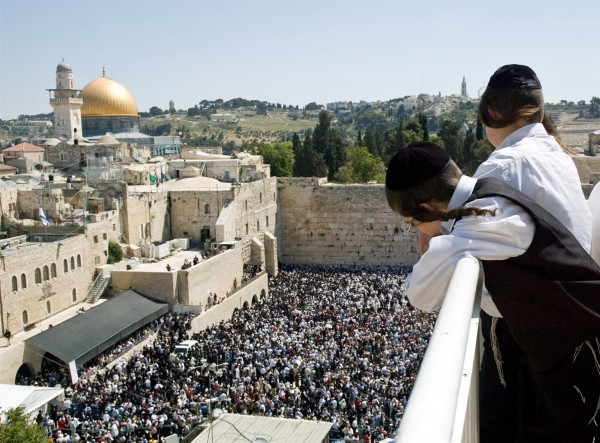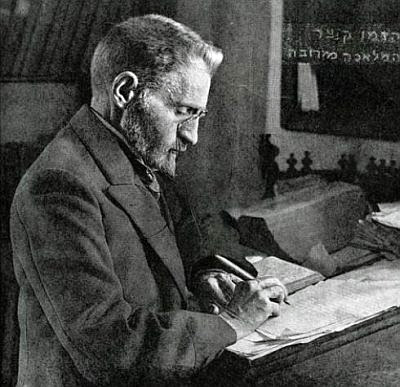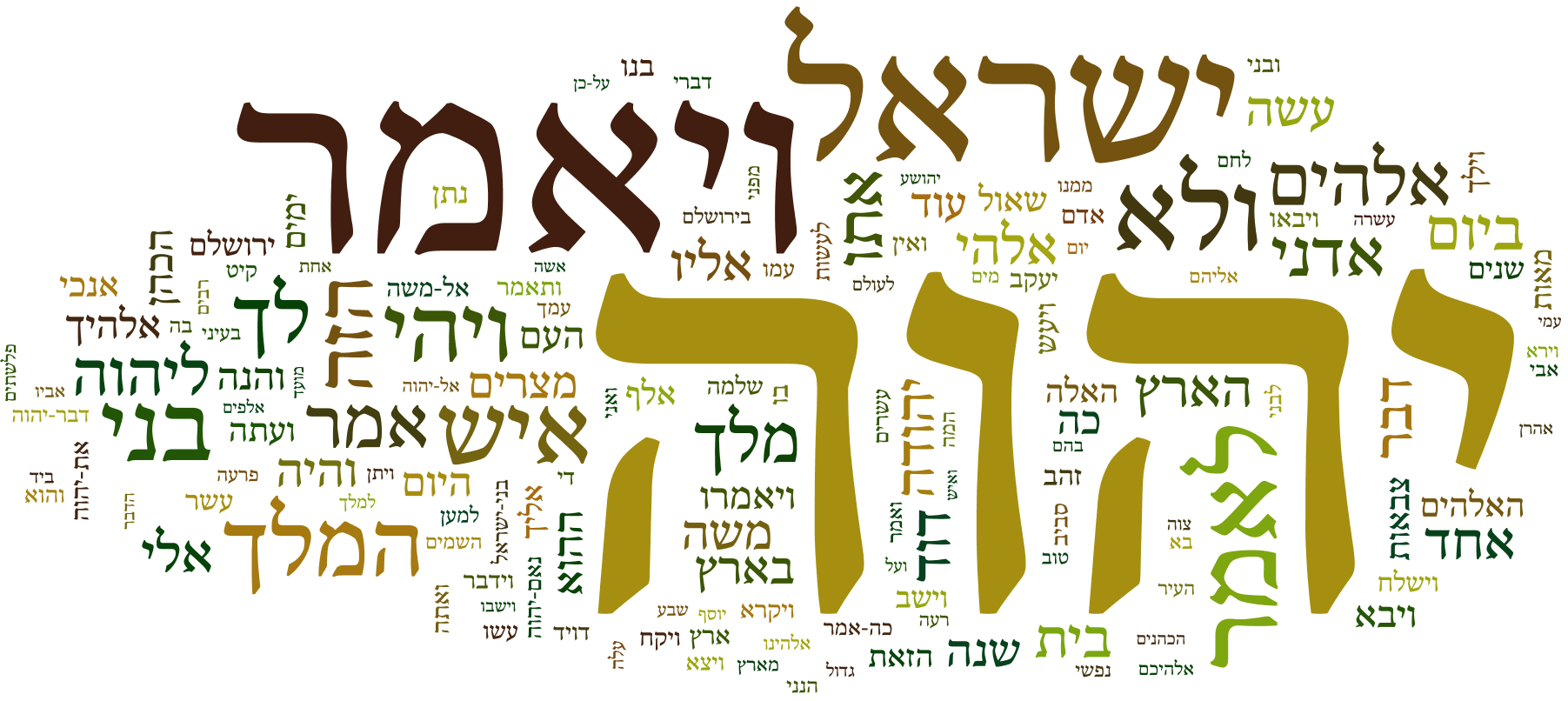 |
| Would you like to know Hebrew? You may be surprised to discover how many Hebrew words you already do know, such as halleluyah, amen, and shalom. |
.
 Hebrew has against all
odds defied extinction. The fact that it’s now a modern language used daily by
more than seven million people in Israel and in Jewish communities around the
world is an absolute miracle. Believers who learn Hebrew today are doing far
more than simply learning another language; they are participating in a great
end-time move of the Spirit of God, reconnecting the Church to its Jewish
roots, and revealing the true identity of HaMashiach (the Messiah)—Yeshua.
Hebrew has against all
odds defied extinction. The fact that it’s now a modern language used daily by
more than seven million people in Israel and in Jewish communities around the
world is an absolute miracle. Believers who learn Hebrew today are doing far
more than simply learning another language; they are participating in a great
end-time move of the Spirit of God, reconnecting the Church to its Jewish
roots, and revealing the true identity of HaMashiach (the Messiah)—Yeshua.
Bibles For Israel
“For out of Zion shall go forth the Torah and the Word
of LORD (YHVH)
from Jerusalem.” - Isaiah 2:3
from Jerusalem.” - Isaiah 2:3
Let’s
take a brief look at what these three words really mean and discover the man
and the miracle that has revived the Hebrew language around the world after
2,000 years of linguistic exile.
Halleluyah
actually consists of two Hebrew words: hallelu, meaning praise (a
plural imperative) and Yah (shortened form of Yahweh, the
personal name for God and often written as LORD)
Amen, a Hebrew word commonly said in prayer means
dependable, faithful, certain and true.
This
word has the connotation of faith, since its root A-M-N can mean faithful, have
faith, believe, reliable, confirmed, and to be firm.
Amen is often translated as truly or verily in the Brit
Chadashah (New Testament), which we will see later is quite Hebraic.
“In that day you will not question Me about anything.
Truly, truly, (amen, amen) I say to you, if you ask the Father for anything in
My name, He will give it to you.” (John 16:23)
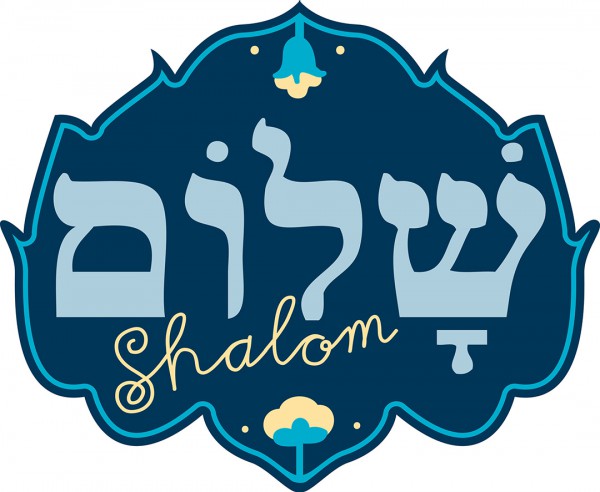 |
| The Hebrew word Shalom, read from right to left. |
It
encompasses wholeness, blessing, and well-being. It is also used
conversationally to greet others hello and goodbye.
The
Miracle of the Survival of Hebrew
The fact that it’s now a modern language used daily by
more than seven million people in Israel and in Jewish communities around the
world is an absolute miracle.
Logically,
Hebrew should have died out two millennia ago after Rome destroyed Jerusalem in
AD 70 and defeated the Bar Kokhba revolt in 135, resulting in the scattering
(Diaspora) of God’s Chosen People to lands near and far.
In
the Diaspora, the Jewish People acquired the local language for everyday use.
 |
| The Great Synagogue on Dohány Street in Budapest, Hungary is the largest synagogue in Europe and one of the largest in the world. It seats 3,000 people. |
While
noticeable differences between Ancient and Modern Hebrew exist, they are not
drastic.
In
fact, if Moses were to return today, he would likely understand modern Hebrew,
though he would have to learn some new words as well as adjust to some
differences in syntax (arrangement of words to form a sentence).
Some
of these syntax changes are due to the influence of Yiddish, a combination of German,
Hebrew, Slavic, and other European dialects that became the spoken vernacular
of Ashkenazi Jews in central and eastern Europe beginning in the ninth century.
And,
of course, many words had to be introduced to accommodate technical and
cultural innovations.
Eliezer
Ben-Yehuda: Father of Modern Hebrew
 |
| A Jewish man reads at the Western Wall in Jerusalem. |
He
used Joshua to bring them out of the wilderness into the Promised Land.
And
He used Cyrus to bring them out of Babylon and even help them rebuild the
Temple.
The
movement of Jews back to the Biblical land of Israel in the last two centuries
required many such courageous partners and visionaries.
In
the area of language, God used a man named Eliezer Ben-Yehuda to help teach the
Jewish People leaving the Diaspora how to speak Hebrew again in modern
pre-state Israel, a move of God that was prophesied 2,700 years ago:
“Do not fear, for I am with you; I will bring your
offspring from the east, and gather you from the west. I will say to the north,
‘Give them up!’ and to the south, ‘Do not hold them back.’ Bring My sons from
afar and My daughters from the ends of the earth.” (Isaiah 43:6)
Ben-Yehuda,
whose name means son of Judah, was born Eliezer Yitzhak Perlman
in Luzhki, located in the former Soviet territory and modern nation of Belarus.
He
believed that the revival of the Hebrew language in the Land of Israel could be
the key to uniting the scattered Jews.
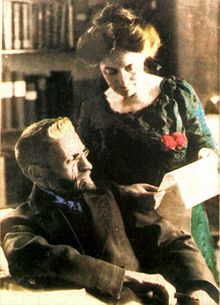 |
| Eliezer Ben-Yehuda and wifeBen-Yehuda and his wife Hemda, 1912 |
Making
aliyah (immigrating) to the Promised Land in 1881 at the age of 23, he set out
to revive Hebrew as the native tongue for future generations of Jewish olim
(immigrants).
History
has proved his strategy to be successful.
Ben-Yehuda:
Radical Approach to Reviving Hebrew
Eliezer
Ben-Yehuda took a radical approach to his mission: some might even say fanatical!
He
insisted that only Hebrew be spoken in his home.
He
is even reported to have admonished his wife after hearing her sing a Russian
lullaby to their child.
The
first native speaker of Modern Hebrew was his son, Ben-Zion (Zion’s son), who
also was only allowed to speak Hebrew.
His
extreme efforts paid off.
By
setting an example in his own family and taking students into his home to learn
Hebrew, along with the help of others passionate for the cause of national
unity, he helped to start a linguistic revival.
The
Development of Modern Hebrew
Ben-Yehuda’s
deep calling and conviction caused him to push forward even amid
ultra-religious Jews who accused him and his work of being blasphemous.
After
millennia of isolated use, Hebrew had been viewed by these Orthodox Jews as the
one and only Holy Language, which should be spoken only during prayer and in
the synagogue.
Through
one of the newspapers that he edited, Ha-Zvi, Ben-Yehuda not only promoted his
edgy Hebrew vernacular, he waged war against certain religious practices and
customs in the Land, which led to his arrest and the closing of the paper for
fourteen months in 1894. (National Library
of Israel)
The
Orthodox community even declared Ben-Yehuda herem (excommunicated), but he did
not waiver. (My Jewish Learning)
In
1890, he established the Hebrew Language Committee (Va’ad ha-lashon
ha-Ivrit).
The
Committee set out to establish uniform standards in grammar, terminology, and
pronunciation that would be used throughout schools, commerce, and government.
It
published bulletins and dictionaries and established thousands of Hebrew words
that are in everyday use today.
 |
| Eliezer_Ben-Yehuda_at_his_desk_in_Jerusalem_-_c1912 |
Ben-Yehuda,
who immigrated a year before the First Aliyah movement (1882–1903), saw the
fruit of his efforts in the Second Aliyah (1904-1914).
In
this movement, 35,000 olim (immigrants), mostly from Russia, entered the
Ottoman-ruled land of pre-state Israel and many embraced Hebrew as their new
spoken and written language.
In
1922, with the region now under control of the British Mandate of Palestine,
Ben-Yehuda and his supporters crossed a great milestone — the formal
declaration of Hebrew as one of the land’s three official languages, alongside
English and Arabic.
Near
the end of that year, on December 16th, Ben-Yehuda died at age 64 of
tuberculosis, a sickness he suffered from for most of his life.
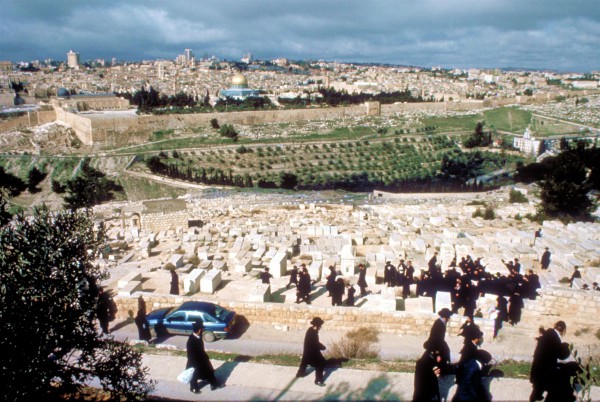 |
| Nearly 150,000 cemetery plots line the western slope of the Mount of Olives, facing the Temple Mount platform. |
A
view of the Temple Mount from the Mount of Olives
To
honor Ben-Yehuda, large Israeli cities often have a street named after
him.
In
fact, the most famous and busy streets in both Jerusalem and Tel Aviv are named
Ben Yehuda Street.
In the book Was Hebrew Ever a Dead Language?, Cecil
Roth succinctly summarized Ben-Yehuda’s contribution this way: “Before Ben-Yehuda, Jews speak Hebrew;
after him, they did.”
Just
five years after the Modern State of Israel was reborn in 1948, the Israeli
government replaced The Hebrew Language Committee with the Academy of the
Hebrew Language, which operates out of Hebrew University in Jerusalem.
The
Academy continues to create new words from Hebrew root word structures as it
replaces loaned words derived from other languages.
It
also continues to set standards for Modern Hebrew grammar, orthography, transliteration,
and punctuation based on the historical development of the language.
Though
it has been labeled Israel’s “language police,” the Academy considers its
decisions binding only on formal speeches and written texts. (Hebrew Academy)
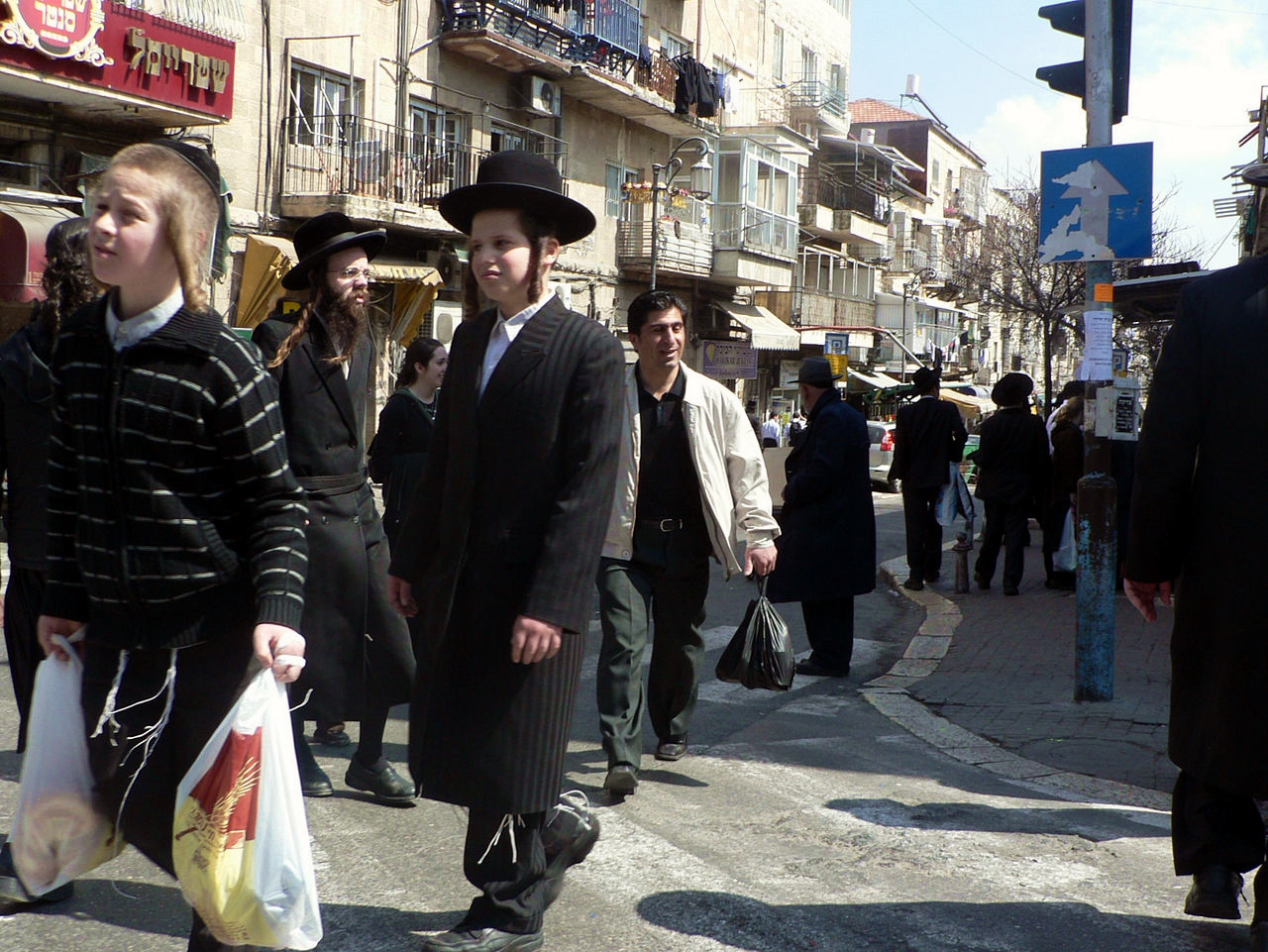 |
| The Mea Shearim neighborhood in the heart of Jerusalem. |
Even
so, when they pay bills, deal with Israeli companies on the phone, and interact
with the larger society, they do have to speak Hebrew.
The
Hebrew Bible
While
Aramaic was at one time the common language of the Israeli people, including
Yeshua (Jesus), it accounts for less than one percent of the Tanakh (Old
Testament), which was written primarily in Hebrew.
Out
of the over 23,000 verses in the Tanakh, only 250 are written in Aramaic. We
find Aramaic, for example, in Ezra 4:8–6:18 and 7:12–26, Daniel 2:4b–7:28, and
Jeremiah 10:11.
And
although the Brit Chadashah (New Testament) is written primarily in Greek with
some Aramaic, it is very Hebraic in nature.
Why?
The writers are Jewish, the culture is Jewish, the religion is Jewish, the
traditions are Jewish, and the concepts are Jewish!
The apostle Paul who wrote thirteen of the
twenty-seven books of the Brit Chadashah even identified himself as being “circumcised
on the eighth day, of the people of Israel, of the tribe of Benjamin, a Hebrew
of Hebrews; as to the law, a Pharisee.”
(Philippians 3:5)
 Because
of the strong Jewish identity of its writers, we find throughout the Brit
Chadashah numerous references to the prophecies and practices of the Hebrew
Scriptures.
Because
of the strong Jewish identity of its writers, we find throughout the Brit
Chadashah numerous references to the prophecies and practices of the Hebrew
Scriptures.
For
that reason alone, learning Hebrew helps us to better understand the true plans
and purposes of God.
A
Jewish man reads the TorahRoy Blizzard, Jr. in Understanding the Difficult
Words of Jesus said,
“If any additional advances are to be made, especially
in better-understanding the words of Jesus, the concentration must shift to the
study of Hebrew history and culture, and above all, the Hebrew language.”
Believers
who learn Hebrew today are doing far more than simply learning another
language; they are participating in a great end-time move of the Spirit of God,
reconnecting the Church to its Jewish roots, and revealing the true identity of
HaMashiach (the Messiah)—Yeshua.
“For out of Zion shall go forth the Torah and the Word
of LORD (YHVH)
from Jerusalem.” - Isaiah 2:3
from Jerusalem.” - Isaiah 2:3
First and foremost, our
mission is ministering to Jewish people with love and comfort.
“Comfort, comfort my people
(Israel), says your God.” Isaiah 40
Located in the Holy Land, the Bibles
For Israel ministry is producing the first-ever Messianic Prophecy Bible.
We educate Jewish people on
the prophecies about the Messiah in the Tanakh (Hebrew Scriptures), showing the
truths by defining the Messianic and rabbinical points of view.
Not only are we creating the
free Messianic Prophecy Bible in print form, we are tirelessly working on the
creation of free Bible software for mobile and computer devices.
This free software will be
used by everyone – from seminary students to Sunday school children in African
villages, and those who are scattered around the four corners of the
earth.
Our Bible will reach millions
of people in hundreds of languages, spanning all 257 countries and territories
in the world.
We also minister to the
spiritual and financial needs of the elderly, poor, and single parents.

